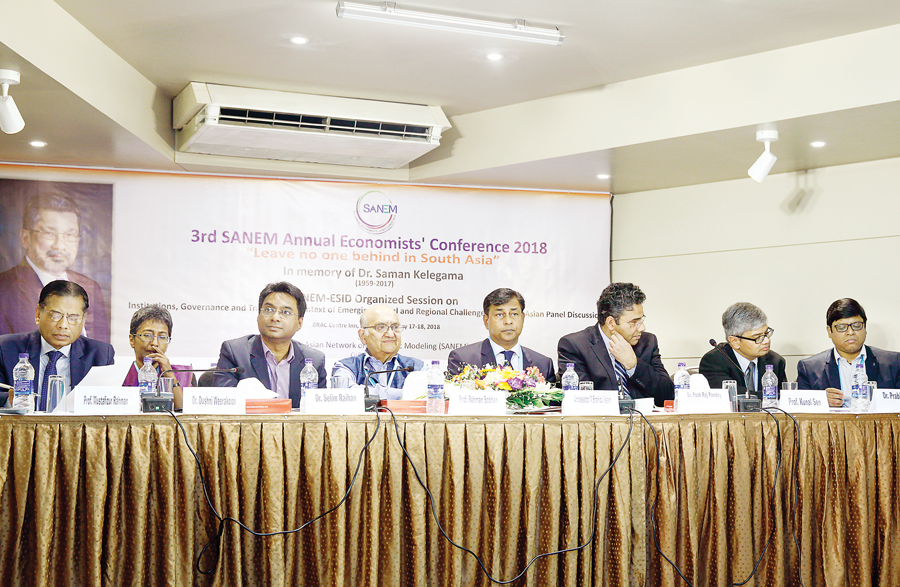Published in Dhaka Tribune on Sunday, 18 February 2018
‘Restructuring production, export processes indispensable to bolstering transboundary trade in South Asia’

South Asia has tremendous potential in the global market that could be fully tapped if these challenges are properly addressed
Eminent economist Prof Rehman Sobhan has pointed out three major challenges behind enhancing cooperation among South Asian countries.
These include addressing political interference, finding ways to restructure both production and export processes, and ensuring infrastructural development.
He made these remarks as the chief guest at a conference session titled “Institutions, Governance, and Trade in the Context of Emerging Global and Regional Challenges: A South Asian Panel Discussion in Memory of Dr Saman Kelegama” on Saturday.
South Asian Network on Economic Modeling (Sanem) has organized the two-day 3rd Sanem Annual Economists’ Conference-2018 at Brac Centre Inn in Dhaka.
Explaining the political hindrance, Prof Rehman said: “Political barriers would come in the way of ensuring trade and transport integration in Asia. When you deal with South Asian issues or cross-border issues, you are traditionally supposed to be dealing with both institutional political players and institutional personal interests through the foreign ministries.
“We will have to autonomously develop an agenda for South Asian cooperation, driven broadly by economic concerns where we are seeking to take advantage of optimality and economic relations.”
He emphasized restructuring production and export processes in order to improve transboundary trade in South Asia.
“Once duty free access to a market is ensured, you have to have something to export by restructuring both production and export processes.”
Bringing about these changes in South Asia is a big challenge for countries of the region, observed Prof Rehman, also chairman of the Dhaka-based Centre for Policy Dialogue (CPD).
Turning to Asia’s economic potential, he said: “…Asia is rising (and) it is the most competitive region, because it is the main source of global reserves and sovereign wealth funds. Also, the capital of South Asian countries also lies in the region.”
It is therefore important to focus on how to develop infrastructure by restructuring the economy, the economist said, stressing the need for stable relations between India and China for the development of regional cooperation in South Asia.
South Asia has tremendous potential in the global market that could be fully tapped if these challenges are properly addressed, he added.
Dr Selim Raihan, executive director of the SANEM and professor of economics at Dhaka University, gave a presentation at the session.
Distinguished panelists of the sessions included Prof Kunal Sen of the Global Development Institute at the University of Manchester; Dr Dushni Weerakoon, executive director of the Institute of Policy Studies in Sri Lanka; Prof Mustafizur Rahman, distinguished fellow at the CPD; Dr Abid Qaiyum Suleri, executive director of Sustainable Development Policy Institute in Pakistan; Dr Posh Raj Pandey, chairman of the South Asia Watch on Trade, Economics and Environment in Nepal; and Prof Dr Prabir De of the Research and Information System for Developing Countries in India.
Prof Kunal identified high tariffs and the cumbersome process of transit and shipment as the key barriers to integration and cooperation among the South Asian countries.
Indian tariffs are high compared with other Asian countries, and at the same time the transit trade and bureaucratic process in shipment are very cumbersome and costly, he said.
Mustafizur Rahman said despite Bangladesh being the second largest RMG exporter, workers employed in the industry are not receiving adequate and just wages.
“Due to institutional weakness, distributional justice cannot be ensured in the value chain,” he said, putting emphasis on protecting interests of all small- and medium-sized enterprises.
Dr Probir De said political will was necessary for an active engagement and cooperation among the South Asian countries.
“We have destroyed our regional institutional arrangements, such as the South Asian Association for Regional Cooperation, because of lack of strong political will. If we are to improve our regional cooperation, we should not destroy such institutions; rather we should help them revive.”
Echoing Probir, Posh Raj Pandey said institutional arrangements would help reduce the costs of trade and increase economic efficiency.


